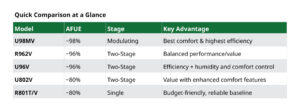When you’re in need of a new furnace, choosing one that fits your home, lifestyle, and climate is a decision that comes with a lot of factors to consider. The right furnace model can make a big difference in the comfort, energy efficiency, and long-term savings that come with getting a new heating system. Ardmore Fresh Air offers a variety of Ruud furnace models to meet different needs and budgets.
What to Look for When Comparing Gas Furnaces
Before deciding on a specific model, it’s important to understand the key factors that can affect your decision. Understanding what to look for when choosing a furnace makes the process easier and helps ensure you install a heating system that works for your home.
- AFUE (Annual Fuel Utilization Efficiency): Higher AFUE means more of your fuel is converted to heat, leading to lower energy bills.
- Heating Stage & Blower Type: Different stages and motor types affect temperature consistency and noise levels, influencing overall comfort.
- Installation & Configuration: Proper placement and setup ensure the furnace fits your home’s layout and operates efficiently.
- Features & Technology: Advanced components such as ignition systems, diagnostic tools, and motor types enhance performance and reduce necessary maintenance.
- Cost vs. Long-Term Value: Comparing upfront costs to long-term energy savings, durability, and comfort helps identify the right model for your needs.
Comparing Specific Ruud Furnace Models Offered By Ardmore
When you’re choosing a Ruud furnace, understanding how each specific model performs helps you match the right unit to your home’s heating needs, budget, and comfort preferences.
Ruud U98MV Endeavor Ultra Series Gas Furnace
- Efficiency: ~98% AFUE, one of the most efficient furnaces Ruud makes.
- Features: Modulating heat output, constant CFM motor, EcoNet® enabled, and advanced diagnostics.
- Best For: Homes in cold climates where maximum comfort, energy savings, and consistent temperatures are priorities.
Ruud R962V Achiever Plus Series Gas Furnace
- Efficiency: ~96% AFUE with variable-speed configurations available.
- Features: Two-stage heating, EcoNet® and Bluetooth-ready monitoring, and PlusOne™ diagnostics.
- Best For: Homeowners seeking balanced performance and efficiency without the premium cost of modulating systems.
Ruud U96V Ultra Series Gas Furnace
- Efficiency: ~96% AFUE, strong performance in most climates.
- Features: Two-stage heating, variable-speed blower, PlusOne™ ignition and water management, and EcoNet® enabled.
- Best For: Those who want high efficiency, advanced humidity control, and quieter operation.
Ruud U802V EcoNet™ Enabled Ultra Series Gas Furnace
- Efficiency: ~80% AFUE with variable-speed blower.
- Features: Two-stage operation with EcoNet® connectivity and variable-speed motor.
- Best For: Smaller homes or mild climates where lower AFUE is sufficient, but improved comfort control is desired.
Ruud Achiever Plus / Classic Series (R801T/V)
- Efficiency: ~80% AFUE, reliable baseline performance.
- Features: Single-stage operation, PlusOne™ ignition and diagnostics, and horizontal/upflow configurations.
- Best For: Budget-minded homeowners or homes where moderate efficiency is acceptable.

How to Match a Furnace Model to Your Home
Choosing the right Ruud gas furnace depends on your home’s size, climate, lifestyle, and comfort priorities.
For smaller homes or those in milder climates, models like the U802V or R801T/V provide reliable, budget-friendly heating.
Larger homes or colder climates require more efficient models with a higher heating output, such as the U96V or U98MV, which deliver consistent warmth all winter long.
In cases when space is an issue, multi-position models like the R962V or R801T/V can be installed in attics, closets, or other compact areas without compromising performance.
Homeowners who prioritize comfort and energy savings may prefer modulating models like the U98MV or a variable-speed furnace. These models minimize temperature swings and operate more quietly for a smoother, more comfortable indoor environment.
Cost and Value Considerations
When comparing gas furnaces, think about the impact on your home and lifestyle beyond upfront costs.
- Energy savings: Higher AFUE units lower monthly heating bills.
- Durability & maintenance: Quality installation and warranties ensure long-term performance.
- Comfort & indoor air quality: Variable-speed blowers and modulating heat models are quieter, offer more consistent warmth, and have better humidity control.
- Environmental impact: Efficient furnaces waste less fuel and may qualify for local rebates.
- Financing & discounts: Flexible financing options, seasonal promotions, and utility rebates can make higher-efficiency furnaces more affordable up front while increasing long-term value.
How to Choose & Install the Right Furnace
When picking and installing a Ruud furnace, having a knowledgeable HVAC professional by your side makes all the difference. Start by having a technician perform a load calculation to ensure your furnace is accurately sized and the unit’s configuration matches your existing ductwork.
Be sure to ask about warranties, maintenance plans, and replacement parts, so you know your investment is protected when issues arise and you need furnace repairs.
Ready To Pick Your Perfect Ruud Model?
Not all homes are alike, and neither are furnace models. The right choice depends on your home’s size, layout, and your own needs. By comparing Ruud gas furnaces and consulting with HVAC experts like the team at Ardmore, you can find a system that delivers long-term efficiency, comfort, and reliability.
Contact Ardmore today for a free consultation or estimate, and let our team help you choose the perfect Ruud gas furnace for your home.

